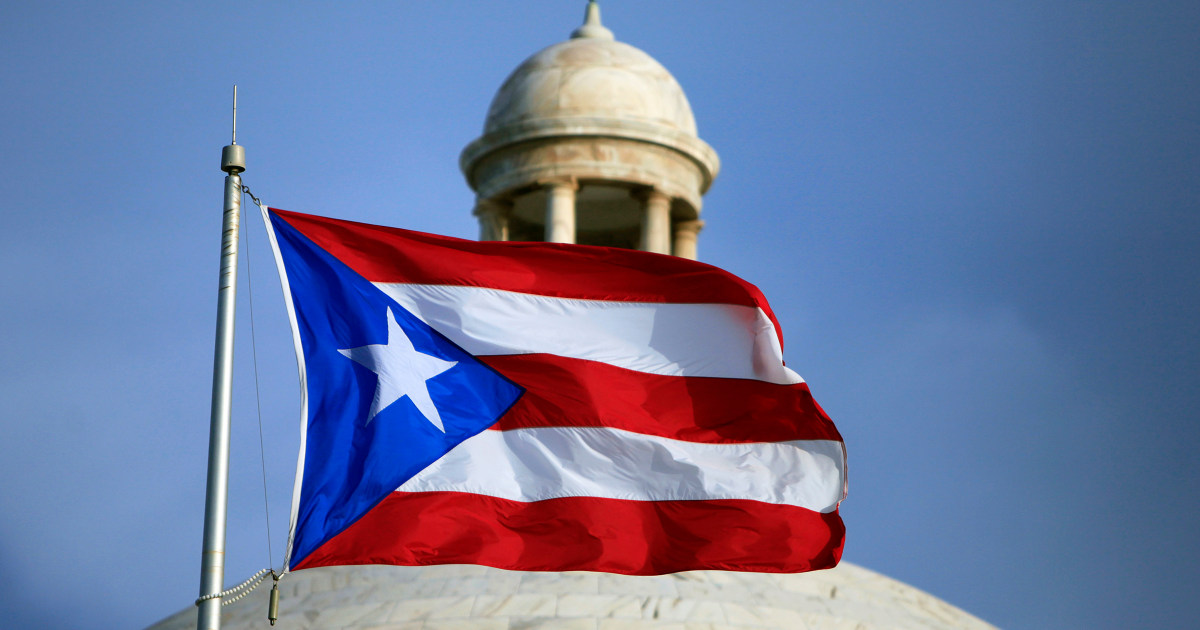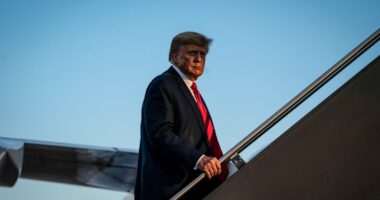
Puerto Rican members of the country’s oldest Latino civil rights organization are rapidly growing their ranks to potentially tilt the group’s coming elections and escalate its lobbying for statehood.
The League of United Latin American Citizens, or LULAC, founded in 1929 by Mexican Americans in Texas, is scheduled to hold its elections this summer at its national convention in San Juan, Puerto Rico — its first conference since 2019 because of the coronavirus pandemic.
LULAC’s president, Domingo García, faces a challenge from Juan Carlos Lizardi, president of a LULAC council in New York and the son of one of LULAC’s board members, Elsie Valdés, who is Puerto Rican and a statehood activist.
The contest is pushing LULAC further into the fight over Puerto Rico’s status, worrying some members that if Lizardi wins, the issue will dominate over others for which LULAC advocates.
It also stands to shift the leadership of the organization, which has always been Mexican American. LULAC was formed Feb. 17, 1929, in Corpus Christi, Texas, by Mexican Americans in the state, some of them business leaders and professionals.
As the election plays out, the divisive issue of Puerto Rico’s status is also creating some fractures within LULAC.
Puerto Rico is a U.S. territory. Although all Puerto Ricans are U.S. citizens, those who live on the island cannot vote in U.S. congressional or presidential elections. The territory’s representative in Congress — called a resident commissioner — cannot vote on legislation on the floor.
Puerto Ricans are divided among those who want statehood and those who prefer the current territorial status; a smaller percentage want Puerto Rico to be independent. Previous votes on the issue in Puerto Rico have been rife with controversy.
Although LULAC’s CEO recently said the organization is taking a stand in support of statehood, based on a 2018 resolution, its president said otherwise.
“I support Puerto Ricans’ right to self-determination and a fair election,” García told NBC News. “But LULAC is bigger than that. We’re dealing with immigration and education and funding for that. I just met with the chief of police in Los Angeles regarding criminal justice reform.”
Lizardi and his supporters hold an advantage in the election because LULAC’s constitution allows only those who show up at the conference to vote.
Some LULAC members are forgoing the trip to Puerto Rico for the July conference because of cost concerns. In a close vote, the LULAC board rejected proposals to cancel this year’s conference.
Meanwhile, members on the island are rapidly escalating the number of “councils” — LULAC’s local entities — in Puerto Rico and New York. Most have been formed in the past three months.
Last year, Puerto Rico had 54 councils. As of this month it has 170 — having added 116 in the last two months. Texas, because it is where LULAC was founded and because of its size, has tended to have the most councils; it had 206 last year.
Lizardi did not respond to email or phone messages requesting comment.
In a phone interview, Valdés said councils are often created at election time when there is more interest in the leadership races, which motivates involvement. Other candidates have formed councils in Puerto Rico, more than this year, to increase their votes, she said.
“All presidents elected since Belen Robles up to Domingo Garcia have been elected thanks to Puerto Ricans’ votes,” said Valdés, a 32-year LULAC member and the organization’s national VP of the Women’s Commission.
Hilda Duarte, the president of a Dallas LULAC council, said she may not be able to afford to attend the convention unless other members help pay her costs.
She said she is concerned about the sudden growth in LULAC councils in Puerto Rico and how it might shift LULAC’s priorities.
“The Puerto Ricans want statehood. That’s something they have to decide. They are the ones who have to vote and get excited and once and for all settle their future. … We’ll support whatever they do,” Duarte said.
Two bipartisan bills addressing Puerto Rico’s status are competing in Congress, both sponsored by Puerto Rican members of Congress. One is pushing for statehood and the other would create a process for deciding Puerto Rico’s status.
‘This is a Latino issue’
This month, LULAC CEO Sindy Benavides refocused attention on LULAC’s 2018 resolution supporting statehood, resurfacing it in a recent interview in The Hill.
Until the interview, the nearly four-year-old resolution has gotten little attention since its passage by LULAC members who attended its 2018 Phoenix convention.
The resolution demanded that the president and Congress admit Puerto Rico as the 51st state. It said that to resolve Puerto Ricans’ lack of equal civil rights, “LULAC must support any related legislation in the Federal Congress supporting Statehood.”
García was made president at the same conference, so his name is on the resolution even though he was about to begin his duties.
LULAC approved resolutions in 2011 and 2012 that supported self-determination for Puerto Rico and discussed statehood as an option.
Benavides said in a phone interview on Tuesday that García’s position of support for self-determination is a “departure from the National Assembly.”
“We are supporting and we have been public about supporting HR1522 (the statehood bill in Congress),” Benavides said.
She attributed the stepped-up focus on the resolution and the activity around it to the treatment of Puerto Ricans after Hurricane Maria ravaged the island in 2017 and other major natural disasters its experienced.
“What has become more clear to LULAC and I think the entire country is how Puerto Rico is treated as second-class citizens,” she said.
Hispanic Federation, a growing Latino advocacy group that has more Puerto Rican leadership, supports self-determination and has not taken a position on the options.
Amid leadership turmoil, fighting for issues
The internal struggle is another chapter in LULAC’s history of tumultuous leadership transitions.
García, a trial lawyer from Dallas who is Mexican American, became LULAC’s president when the group forced its previous president, Roger Rocha, to step down because of backlash over his relationship with former President Donald Trump.
The turmoil publicly wounded LULAC and left it in a difficult financial position.
Nonetheless, LULAC more recently has fought voting rights and redistricting battles, pushed for immigration reform, protested the detention of children crossing the border and supported and joined in protests with the family of Vanessa Guillén to force the Army to investigate her disappearance and slaying.
LULAC also advocated for a new law to revamp military investigations of sexual assault and harassment in response to Guillén’s death. It also championed the Brandon Act, mental health legislation for military personnel named for Navy Petty Officer Third Class Brandon Caserta.
García said LULAC was $1.4 million in the red when he took over and that he was just recently able to get its first $1 million donor in a decade.
García said he’s used his own funds to cover costs related to the group’s work, including $25,000 offered as a reward in the search for Guillén when she was missing, a contribution to Iowa’s LULAC council to help in voter registration and turnout in 2020 and money to bring Puerto Rican members to Washington, D.C. to lobby for disaster aid for the island. He said he also waived the group’s $90,000 honorarium as president.
García benefited in his election from LULAC’s rule allowing only those who attend the conference to vote. But he said he has been advocating for that to change.
Joe Enríquez Henry, the state political director for LULAC Iowa, said members in Iowa have not yet decided whom to support. They are waiting to hear from candidates, he said.
He acknowledged Garcia’s work but said LULAC needs to broaden its voices, including those of members in the Midwest, where he said membership is growing.
He said that as long as he has been in LULAC, its Puerto Rican members have supported statehood.
“It doesn’t matter if the Puerto Rican members are fighting for statehood,” he said, “as long as they realize that every year we go up to D.C., we are fighting on a long list of issues.”
Valdés said that regardless of the election’s outcome, she’ll continue her work with the organization. It’s the one group, she said, that really “lends a hand” when it comes to Latinos.
Follow NBC Latino on Facebook, Twitter and Instagram.
Source: | This article originally belongs to Nbcnews.com









